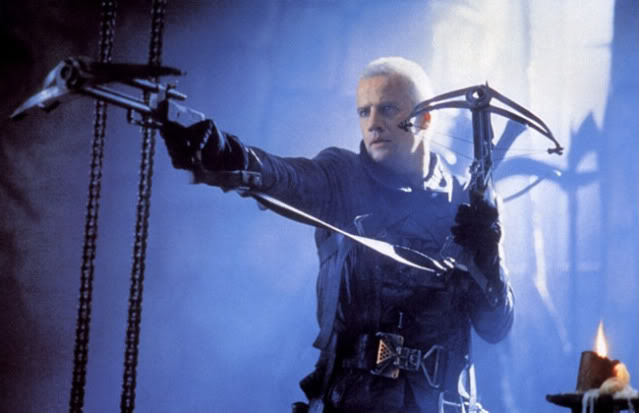Saying that, it hasn't been all bad, as I got to speak at the EMICS Stories and Storytelling in the Medieval World in University College London last April, where I spoke about Zemeckis's -let's be honest - god-awful adaptation of Beowulf, which this post is going to be about.
Despite the film's absolute over-indulgence in CGI, cringe-worthy quotes, and frat-boy-inspired antics, it must be said, the 2007 adaptation is one of the most engaged with the actual poem, and with scholarship surrounding the poem. This can't be too surprising, seen as the film's script was actually written by Neil Gaiman and Roger Avary. Neil Gaiman is a pretty adored author who obviously goes to a shitload of effort when researching his work (as we can see with American Gods) and he also has written two short adaptations of Beowulf (Bay Wolf and The Monarch of the Glen which can be found in Fragile Things and Smoke and Mirrors). Roger Avary then, co-wrote the screenplay of Pulp Fiction and Reservoir Dogs and the screenplay for that mad bastard, Bret Easton Ellis's The Rules of Attraction - an impressive enough CV.
So it's safe enough to say the film's storyline was in good hands. Minus the terrible dialogue which included Hrothgar naming Unferth as "violator of virgins" and the mind-numbing song that would appeal to teenage boys and (hopefully) nobody else.
The most obvious thing that stands out in this Beowulf when comparing it to the Anglo-Saxon poem, is the sex. Especially the Grendel's mother sex. And the fact that she's a naked, high-heel-footed, golden, reptile (but sexy reptile) thing. Pretty much along the same lines as Graham Baker's less well-known 1999 adaptation, which was so bad that it was sort of okay (let's not get ahead of ourselves).
Despite this being an extremely sexualised view of Grendel's mother, and one which can be described as a great example of what Anita Sarkeesian calls the "Evil Demon Seductress" (think Megan Fox in Jennifer's Body, or Scarlett Johannsson in Under the Skin, or that roboty wan in one of the Transformers films - a trope which generally allows audiences to sexualise and demonise women at the same time), there is the possibility of there being a deeper meaning to this portrayal (not that the young men this film was obviously targeting gave even one solitary crap!).
As with most adaptations, it says something about its own time, the 21st century - a time where the main concerns are not anything like those of the Anglo-Saxon's, but circulate more around the self, with anxieties about sexuality and masculinity. Zemeckis's film could have left out the sexual element included, but heroes always get the girl (even if she's not really a girl, as in this case), and if Beowulf wasn't seduced by naked-golden-Ridley-Scott-Alien-Angelina, then there would be no doubt people would think, "what a fag, like, I'd totally nail her". Anxieties about homosexuality still exist, and the film-makers do not want to put Beowulf's sexuality into question. And if there's anything we can learn from films, it's morals (the couple always die first in the horror film, guys, so ABSTAIN. And the black guy always dies too...so...don't be black?). And because we live in a society where people are still shit-scared of sexually- and otherwisely powerful women, those women must be demonised, while the chaste Wealhtheow's of the world are revered.
But, there is a faint glimmer of hope. There lies the possibility that Jane Chance's article "The Structural Unity of Beowulf: the Problem of Grendel's Mother" had somewhat of an influence - in this article, Chance argues that there exist sexual undertones in the scene of Beowulf and GM's battle, with each other fighting for a dominant position astride the other and the ripping of chain mail and trying to penetrate each other with daggers and rolling about and, god, I gotta open a window. Seriously though, it's possible.
Of more importance is the sword, which in the poem, melts when Beowulf decapitates Grendel's corpse, but in the film, melts ("into gory icicles") when Grendel's mother caresses it, in the most obvious sexual innuendo in film history. And the poem itself seems to treat the giant's sword in the same way - it is described as being "a blade that boded well . . . an ideal weapon, one that any warrior would envy, but so huge and heavy of itself on Beowulf could wield it in battle" (from Heaney's translation). Like, seriously.
Maybe a stronger argument for the depiction of GM as a golden sex beast, is because of its (possible) influence by the work of Frank Battaglia, which seeks to view Grendel's mother as an ancient earth goddess, Gefjon (related perhaps to Freyja and Nerthus). Grendel's mother does look a bit more like a goddess than a monster (or normal woman as I like to argue!), right? And besides, in Caitlin Kiernan's novelization of the film, she mentions Nerthus, and other Germanic and Norse gods, for whom GM has been presumed to be. Despite appearing to be a rather obscure source of inspiration for a film, it seems to fit pretty well. I think. Whatever.
So, although at first the portrayal of GM is kind of ridiculous, and kind of roll-eyes worthy at first, it appears that some thought did actually go into her appearance, besides whatever would make the most money (although I'm sure this was priority!). It goes to show that some of these films can't be presumed to be uneducated pieces of garbage (most anyway!), and they are interesting to study in relation to their engagement with the poem. Basically, every adaptation has something to offer, whether in how it uses the poem to express its own concerns, and how it chooses to engage with the poem and with scholarship.








